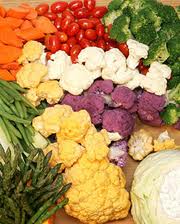Is there a key to living a long life? Well, if you asked my 98 year old neighbor, he would give you about seven keys to living a long life. Two of my favorites on his list are 1) Challenge yourself mentally every day and 2) Stay active. He is still hosting happy hour at his house for the neighbors about once a month and works out with a personal trainer twice a week, so maybe he does know what he is talking about… There is more evidence every day that what we put in our mouths directly affects our health and of course will directly affect how long we live. To add to George’s keys to living past 90 years, I would add these additional keys to EATING for a long life.
Antioxidants
Eat foods rich in antioxidants to help fight free radicals – unstable oxygen molecules that contribute to the aging process. Colorful vegetables and fruits like berries, beets, and tomatoes contain antioxidants. To help reduce your risk of developing cancer and heart disease, add at least five to nine servings of fruits and vegetables to your diet every day.
Olive Oil
Beyond the fact that olive oil tastes great, it may also increase your memory. A compound in extra-virgin olive oil called oleocanthol is a natural anti-inflammatory and produces effects similar to ibuprofen and other NSAIDs. One study of men showed that olive oil, especially extra-virgin, increased HDL, the good cholesterol that clears fat from blood vessel walls.
Berries
Berries are of course a great source of antioxidants. Strawberries, blueberries, and acai berries are just some examples of berries that contain polyphenols. These powerful compounds may help combat cancers and degenerative diseases of the brain. Frozen berries contain polyphenols too; so grab some from your market freezer so you can get the benefits year-around.
Fish – Brain Food
Fish has been called “brain food” because its fatty acids, DHA and EPA, are important to brain and nervous system development. Eating fish one or two times a week may also help lower your risk of dementia. Omega-3 fats in fatty fish can lower cholesterol and triglycerides and can also help ease the inflammation that leads to atherosclerosis.
Beans for Fiber
Fiber may help lower blood pressure, improve cholesterol, prevent constipation, and help digestion, so add fiber-rich beans to your diet three to four times per week. All that fiber also helps you feel full longer, which can really help you to lose weight. Top your salad with chickpeas or replace the meat in soup and chili with beans. Beans contain complex carbohydrates to help regulate glucose levels, which is important for all of us, but especially people with diabetes.
Vegetables
Veggies contain fiber, phytonutrients, and loads of vitamins and minerals that may protect you from chronic diseases. Dark, leafy greens contain vitamin K for strong bones. Sweet potatoes and carrots contain vitamin A, which helps keep eyes and skin healthy and protects against infection. In one study, men eating 10 or more servings of tomato products per week saw a 35% decrease in their risk of prostate cancer. The list of nutrients and studies showing decrease in disease risk could go on for days, but the important point is that no adult or child can eat a healthy diet if it does not contain vegetables. There are no foods or supplements that can substitute for the benefits of vegetables.
Eating Mediterranean
The people living near the Mediterranean regularly incorporate olive oil, fish, whole grains, and an occasional glass of red wine into their meals. Instead of salt, they rely on spices and herbs to flavor their foods. This diet can be beneficial to heart health, can reduce the risks of mild memory impairment, and may ward off certain cancers.
Nuts
Whether eaten whole or in ground paste, nuts are packed with cholesterol-free protein and other nutrients. Almonds are rich in vitamin E, which can help lower the risk of stroke for women. Pecans contain antioxidants. The unsaturated fat in walnuts can help reduce LDL and raise HDL cholesterol. It is important to eat nuts in moderation because an ounce contains about 160 calories and 15 grams of fat.
Dairy
Drinking Vitamin D-fortified beverages like milk helps increase calcium absorption. That is especially important for those at risk of osteoporosis. Vitamin D may also help reduce the risk of colon, breast, and prostate cancers. Eat yogurt with live cultures to aid digestion.
Whole Grains
Eating more whole grains may one of the most important things your can do for a long life, as you can decrease your total mortality rate by 15%. Whole grains can reduce your risk of certain cancers, type-2 diabetes, and heart disease, among other things. Choose whole-grain breads and pastas and brown or wild rice instead of white. Drop barley into soups and add plain oatmeal to meatloaf. Whole grains are minimally processed, so they retain more nutritional value. The fiber in whole grains helps prevent digestive problems such as constipation and diverticular disease.
A Healthy Weight
Keeping off extra weight puts less pressure on your joints, less strain on your heart, and can reduce your risk of certain cancers and lifestyle diseases like type-2 diabetes and heart disease. It does get tougher to maintain weight as you get older because metabolism slows and as you lose muscle with age. Select proteins like lean meats, tuna, or beans and include vegetables, whole grains, and fruits. It takes more energy for your body to break down complex carbs, and the added fiber with help you feel fuller. Also, don’t forget what George says and STAY ACTIVE. By continuing to burn more calories through cardiovascular activity and building muscle with strength training, you look and feel better and maintain your weight easier.
Don’t wait until you are 60 years old to start thinking about living a long life. Today is the day that you need to focus on a long life for your entire family. We cannot spend 20, 40, or more years of our life without vegetables, whole grains, etc. and think that it will not affect our health. It is never too late to start making small positive changes in your diet so you can live a longer life. If you would like someone to help you and/or your entire family through every step of your transition to a healthier lifestyle, contact me. Whether you are 4, 44 or 104, I can help you incorporate these keys to a long life into your already crazy schedule. Check out what other clients are saying about their transition to a healthier lifestyle.
Resource: WebMD
WHAT'S FOR DINNER?Tonight Will told me that this was the best dinner EVER... Well, I will chalk that up to him being easy to please, because this was a REALLY easy dinner. The key to it being so simple is to either use a market roasted chicken or have previously home-roasted chicken portioned and frozen, as well as previously roasted peppers and onions portioned and frozen. I simply thawed some chicken, peppers and onions and dinner was 75% complete.
Pulled Chicken Burritos
Servings: 4
4 Whole Wheat Tortillas, burrito size
2 cups of pulled roasted chicken
2 cups roasted bell peppers and onions
1 can black beans, drained and rinsed
1/4 cup fresh pico de gallo
Juice of 1/2 lime
1 cup grated cheddar cheese
Fresh guacamole
In a small bowl, combine black beans, pico de gallo, and lime juice. In each tortilla, place 1/4 to 1/2 cup chicken, 1/4 to 1/2 cup peppers and onions, 2-3 tablespoons of black bean mixture and a sprinkle of cheddar cheese. To roll burrito, fold sides in first and then roll burrito to keep filling secure. If you have a panini press or "George Foreman" type grill, heat on high. Place burrito on press with the seam side down. Burrito will be hot and tortilla becomes crispy. Serve with guacamole and fresh salsa.
Here's to fresh, fast, and fantastic food!






